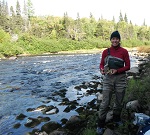News
Friday, March 24, 2017

While Atlantic salmon are an important part of food security, the fish species is culturally significant for the three indigenous groups in Labrador.
The yearly arrival of salmon marks the start of summer for a number of communities. Others celebrate the first capture by sharing the salmon with all community members and in several areas, a community freezer program has been established to ensure that those not able to participate in the long-standing tradition have an opportunity to still enjoy the catch and the nutritional benefits of this healthy country food source.
But what happens if climate change and warming river temperatures impact salmon populations in Labrador? That’s a question the Fisheries and Marine Institute’s Dr. Marie Clément and a large team of academics and local partners are hoping to answer with the development of a water temperature monitoring network in salmon rivers in Labrador, Quebec’s Lower North Shore and northern rivers that show potential to be populated by salmon.
River Research
Despite salmon’s food, social and ceremonial importance to indigenous people, little is known about the impact climate change is having on the salmon rivers.
“Salmon distribution is expected to shift northward as river water temperatures increase, which could benefit salmon populations on the northern distribution of salmon in Labrador,” said Dr. Clément. “However, this overall trend may not apply to all regions.”
For example, the climate in Upper Lake Melville is warmer compared to coastal Labrador. Therefore, rivers draining into Lake Melville, a saline lake supporting important food, social and ceremonial fisheries for Innu First Nation, Nunatsiavut, NunatuKavut beneficiaries, may experience higher water temperatures than Labrador’s coastal rivers and be negatively impacted by climate changes.
Partnering Up
To fill the knowledge gap, Dr. Marie Clément, a research scientist with the Centre for Fisheries Ecosystems Research (CFER) at MI in partnership with the Labrador Institute, and Dr. André St. Hilaire from the I’institut national de la recherche scientifique have developed a water temperature monitoring network in the northern range of Atlantic salmon.
“We have a large team of partners, from government officials to outfitters, members of indigenous groups and researchers who are all working together to ensure the success of this study,” said Dr. Clément. “We have received phenomenal support and I am so proud of the work that has been completed so far.”
The two researchers have teamed up with the Nunatsiavut Government, NunatuKavut Community Council, Innu First Nation, Labrador Hunting and Fishing Association, Torngat National Park, Amec Foster Wheeler, Coaster Association, outfitters (St. Paul’s Salmon Fishing Club, Napetipi River Outfitters and Pourvoirie Mecatina) and the provincial Department of Environment and Climate Change to develop this network.
Dr. Clément stresses none of the work being done would be possible without the cooperation of all partners. “Indigenous and non-indigenous partners are instrumental in the development of this project,” said Dr. Clément. “In 2016, 23 people identified locations where water temperature monitoring stations could be established as well as deployed and retrieved thermographs, often in salmon rivers not accessible by road.”
Data Collection
So far, water temperature data has been successfully collected from 35 rivers located on the North coast of Labrador, South coast of Labrador, Lake Melville, and Quebec Lower North Shore.
“The goal is to develop a community-driven monitoring program to produce a long-term water temperature time series for predicting and better understanding the effects of climate change on salmon populations,” continued Dr. Clément. “This information will provide the data needed for the sustainable management of the fisheries and ensuring food security for future generations.”
The study started in May 2016 and will continue until December 2019. It is being funded by a 3 year grant of $50,000, awarded in 2016 by the Atlantic Salmon Conservation Foundation.
Dr. Clément hopes that the results of this project will give her and the team a better understanding of salmon population dynamics in relation to climate change and help communities plan for the years ahead.





